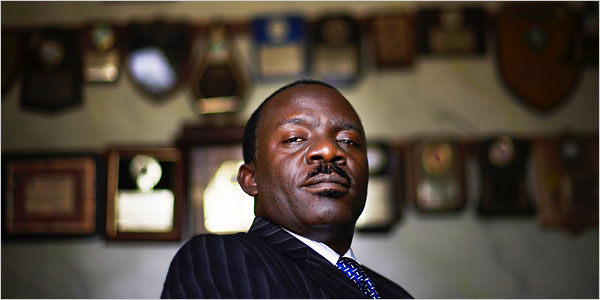A new twist has emerged in the controversy of oil blocks ownership, with Lagos lawyer, Chief Femi Falana (SAN) faulting Senator Ita Enang’s claim that 83% of oil blocks are owned by Northerners, saying that Enang’s list was “grossly misleading,” as contained only names of those who were allocated oil blocks under the defunct military junta.
In a statement he made available to this paper, Falana said that Enang’s list did not include the names of those allocated oil blocks since 1999 by the ruling Peoples’ Democratic Party. Also missing from the list were the names of multinational companies otherwise called oil majors which, he maintained, control and manage the lion’s share of the oil and gas industry.
“The said foreign companies or oil majors own 80 per cent of the oil blocks and as such they are completely in charge of the oil and gas industry. They produce the oil and gas and declare the figures they like. They smile to the banks daily while Nigerians fight over the crumbs from the master’s table,” the statement read.
He noted that there are about 17 foreign oil companies which are the major key players in the oil industry operating the juicy fields, while Nigerians are forced to operate in the marginal fields.
Falana pointed out that in spite of the indictment by the Nigeria Extractive Industry Transparency Initiative (NEITI), some of the oil majors have continued to withhold billions of dollars from the Federation account despite the fact that the joint venture agreements between the federal government and the companies is 60/40 in Nigeria compared to some countries where it is 80/20.
He also alleged that the foreign companies have been conniving with the Federal Government to lease oil blocks allocated to them to other persons.
“Incidentally, the disclosure in the Senate last week coincided with the death of President Hugo Rafael Chavez of Venezuela who nationalised the oil industry that enabled his government to generate enough revenue to fund a comprehensive welfare programme for the hitherto impoverished people of the Latin American country.
“But the enormous common wealth of the Nigerian people has been cornered by a few rent collectors and other members of the parasitic ruling class. A few of them who raked billions of dollars from the illegal sale of the oil blocks have openly confessed that they do not know what to do with the huge fund! Because such wealth has been privatised Nigeria cannot, like Venezuela, meet the eight Millennium Development Goals by 2015,” Falana said.
He further challenged the Ministry of Petroleum Resources to, without any delay, publish an up-to-date list of all local individuals and foreigners who have been allocated oil blocks by the government, adding that President Goodluck Jonathan should thereafter proceed to cancel all oil blocks allocated to a few interest groups and vest them in the federal government in line with section 44 of the constitution.
It was gathered over the weekend that some Northern leaders who were angered by the allegation have claimed that oil block allocation has become more of political patronage since 1999 with southern presidents more in charge.
A source in Minna told this correspondent that some oil blocks which genuinely belonged to some northern businessmen were collected from them during the tenure of President Olusegun Obasanjo even as the blocks were given out then for patronage.
It was further learnt that the leaders are putting their record together to ensure that the truth of oil block ownership is laid bare before Nigerians.
Meanwhile, former military administrator of Kano State, Col Sani Bello (rtd), whose name was linked with AMNI International Petroleum and Development Company, operators of OML 112 and OML 117, also debunked the claims of Senator Enang that he had sole ownership of the company or oil block.
In an interview in Kontagora, Bello said he was only one of three principal shareholders of AMNI, the others being Professor Emma Idozian from Asaba (south-south) and Chief Tunde Afolabi from Ibadan (south-west) while he himself hails from Kotangora, Niger State (north-central).
According to him, the company has a joint ownership of three principal shareholders with 15 others as nominal shareholders and foreign technical partners own 40 per cent shares of the company.
He said though he is the chairman of the company, his shares in the company are not up to 20 per cent and he could therefore not be seen as the sole owner of the company or oil blocks.
“The fact that I am the chairman of the company does not mean I own it. I don’t own AMNI. I don’t have up to 20 per cent in the company,” Bello said.
The elder statesman explained further that the management of the company was entirely in the hands of the foreign technical partners and therefore advised Senator Ita Enang to always verify his facts before making a strait-jacket claim.
He challenged the senator to go to the appropriate bodies like the Corporate Affairs Commission (CAC) to ascertain the ownership of the said company in order to be sure of the true positions of the company, adding that it was unfortunate the claim was made without adequate verifications.
Enang had also claimed the former petroleum minister Rilwanu Lukeman was the major stakeholder in Afren Oil when in fact, Egbert Imomoh had as much stake as Lukman and the largest shareholders were foreigners Ethelbert Cooper and Osman Shanenshah.

